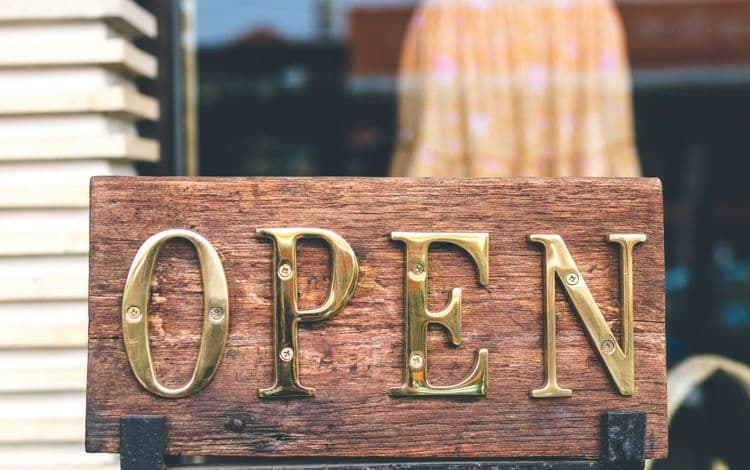With an unemployment rate not seen since the Great Depression, the American economy is hurting, immensely so. And while we have managed to flatten the curve, the country's financial picture did not fare well in the process. Small businesses more so than any other sector of the US economy have taken the greatest hit since the start of the pandemic. Currently, there are approximately 13 of small businesses that have closed—many hoping to reopen, and yet predictions seem to suggest that sadly many will not.
To save off a full-on depression, the country needs to start reopening smart and safely. In reopening and in doing so wisely while protecting the more vulnerable, the country is hoping to see those Americans who are able, returning to work and thus starting to stimulate the economy. That said, most are aware that things will not look like they did before COVID-19. There will be a new normal, new courses charted, new territory to navigate for many of the nation's businesses and workers alike. And yet, it does not have to be a path of recession and depression—we can prosper once again. We simply have to make smart choices going forward.
Some of what is going to be required: extensive and strategic testing, diligent tracking measures, and innovations that enable us to isolate fewer in smarter ways. Currently, it stands to be seen how many tests commercial labs across the country can produce; some say that soon we could see tens of thousands of tests being administered daily. This may mean for instance that small companies can test their employees on a somewhat regular basis and thus stem an issue before an entire community becomes infected.
The reopening process is being left up to the states for the most part. Many of the states are segmenting the reopening process based upon population. For major cities, for instance, the reopening should be slower than it is said in more rural, small-town areas that are far less populated. Again, it is about proceeding in a smart and cautionary way that does not risk exposing those more vulnerable people.
However, contrary to what makes sense in this regard, there are several states which are lumping rural counties with metro regions. In California, 15 counties have not recorded a COVID-19 death and yet they are being held to the same reopening standards as Los Angeles county which has seen a high number of coronavirus deaths. Many officials in less affected counties are pleading with the state's top officials to lessen the restrictions so their people can get back to work and businesses can finally reopen.
Some states are in fact following a localized approach to reopening—this has accounted for a broader and seemingly smarter reopening methodology. The efforts of Florida are a good example of a segmented reopening based upon several coronavirus cases per area. Miami-Dade County, for instance, has a much higher number of COVID deaths than some of the smaller counties in the state. Gov. DeSantis has thus allowed other, less affected areas of the state to reopen. This is a huge boon to small businesses and those previously out of work.
Beyond businesses, we also need to consider some other key societal reopenings and the process by which states will spur this. With hospitals, the recommendation is that all hospitals and nonsurgical centers should reopen to those unaffected by the coronavirus. During the crisis, most had to stop nonessential services—this caused hardship for many. The reopening will not only help people heal and ultimately save lives, but it will also enable hospitals to once again start making money and thereby prevent numerous healthcare centers from having to close down because of lack of funds.
Nursing homes are another area of concern. Particularly vulnerable given their population, there needs to be stringent measures in place upon their reopening. More than ¼ of the country's COVID-19 deaths were seen within nursing homes. And in some states, nursing homes accounted for more than half of coronavirus deaths. There are ways to open the states back up and yet continue to protect the most vulnerable people.
What About Customers?
As businesses do start to open back up, a question that lingers for many business owners is: will customers show up? Every business must take the necessary precautions. And even though a given state does permit reopenings, a company should decide for themselves as far as the exact timing and under what circumstances so that they can operate safely.
The US consumer doesn't know what to think at this point. Some are frightened, some are worried about getting sick, while there are others very much willing to once again patronize their favorite venues. A recent poll conducted suggests that 2 in 5 Americans are going to avoid public gatherings for the near future. And a whopping one in six people says that their fear of public spaces may never go away. Businesses are going to have to demonstrate their safety. They are going to have to be proactive when it comes to convincing consumers that they have taken the necessary precautions to create as safe an environment as they possibly can. Ultimately, the business owners can make better decisions regarding how to keep their patrons safe, as they have far more knowledge about their particular industry than governing officials. Companies must start opening and do so smartly to help bring this economy back from the brink.
If you are a small business owner struggling with the reopening, we are here to help. First Union Lending offers a variety of loan programs geared toward companies just like yours. During this difficult time, you do not have to go it alone. Call today or fill out an online application and let's get started on this journey together!
